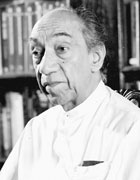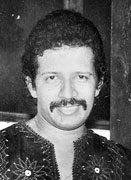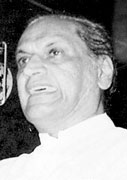Black July 1983 and repercussions
by W.T.A. Leslie FERNANDO

J.R. Jayewardene |

Wijaya Kumaratunga |

Hector Kobbekaduwa |
When J.R. Jayewardene won the Presidential Election 1982, his main
opponent Hector Kobbekaduwa of the SLFP polled 39.7% of the votes. In
the Jaffna district Hector polled 77,300 odd votes, whereas J.R.
Jayewardene could get only 44,780 votes. The sole Tamil candidate Kumar
Ponnambalam got 87,265 votes, about 10,000 votes over Hector Kobbekaduwa.
Although the JVP leader Rohana Wijeweera could get only 2.19% of the
total votes, the JVP election campaign displayed the organising ability
of the party. J.R. Jayewardene realised that at a General Election, the
UNP would not be able to get the 5/6 majority it enjoyed at the time. So
he decided to extend the term of Parliament by a Referendum.
It was the 1970-77 Coalition Government that provided a precedent for
it. The term of that government was to end in 1975. With the 1972
Constitution, it extended its term by another two years. J.R.
Jayewardene justified the Referendum saying that 1970-77 coalition had
extended its term without the will of people whereas he is doing it only
with the consent of the people.
Before the Referendum the 'Attha' journal that played a prominent
role in the Presidential Election campaign of Hector Kobbekaduwa was
censured and its office was sealed. The powerful leaders of the SLFP
like Ratnasiri Wickramanayaka and Wijaya Kumaratunga who worked hard for
Hector Kobbekaduwa were taken into custody under a bogus Naxalite
charge.
'Lamp', the symbol in favour of extending the term of Parliament was
exhibited in public places. The order given by the Elections
Commissioner to remove them was not implemented by the police. Those who
opposed the extension were subject to bouts of thuggery and their
polling agents were taken into custody under various pretexts. As a
result such polling agents had to be withdrawn from the Attanagalla
electorate.
On December 22, 1982, the day the Referendum was held, the thugs
dominated at some polling booths. There was mass impersonation and in
some places, the voters were not allowed to exercise the vote. In some
booths, the voters had to mark the ballot and show it to the thugs. Even
Hector Kobbekaduwas was impersonated. It is said that upto that time
Referendum was the most corrupt election.
With all the thuggery and corruption when there were 31,452,233 votes
in favour of the extending the term of Parliament, there were also
2,605,983 votes against it. The votes of the Workers' Congress led by S.
Thondaman helped a long way for the victory of J.R. Jayewardene. The
leader of the JVP, Rohana Wijeweera filed a case in Courts to declare
the Referendum a nullity. All the allegations made by Wijeweera were
confirmed by the report of the Election Commissioner. However, he could
not maintain the action as the JVP was proscribed after the ethnic riots
in 1983.
On May 18, 1983, there were by-elections for 17 selected seats lost
by the UNP at the Referendum. Out of them UNP won 14, SLFP two and the
MEP one. As the MEP leader Dinesh Gunawardena won the Maharagama seat
contested in collaboration with the SLFP, the MEP got representation in
Parliament.
By this time, attacks by Tamil armed groups on Government forces
intensified. On July 23, 1983, thirteen soldiers died in a bomb
explosion. As a result ethnic riots named later as the 'Black July'
broke out all over the country.
The Black July created a worldwide black mark on Sri Lanka. However,
the UNP Government was lukewarm in suppressing the riots. The rampage
began on July 24, 1983, but the Government did not declare a curfew till
2 p.m. on July 26. Even that was not properly implemented. President
J.R. Jayewardene addressed the nation only on July 28. There was a
rumour that some government supporters were behind the riots.There were
criticisms all over, on the manner the Government had reacted to
suppress the situation. The Government in order to save its face
proscribed the JVP, NLSSP and CP on July 30, 1983 thereby implying that
they were behind the riots. Accordingly 30 from the JVP including Lionel
Bopage and some active members of the CP were taken into custody. The
leaders of the JVP including Rohana Wijeweera and the leaders of the
NLSSP went underground. The proscription against the NLSSP and the CP
was lifted on March 1984, but the ban against the JVP continued.
After the Black July, the ethnic issue became worse and the
Government called an All Party Conference which was pledged in the UNP
manifesto of 1977, in the latter half of the 1983. For this conference
in addition to the party leaders, the religious dignitaries too were
summoned. At this conference all agreed for some devolution of power.
Although the SLFP did not attend the conference, UNP, MEP, Leftist
parties, TULF and the religious leaders participated. The MEP and the
Buddhist leaders took up the position that a unit of devolution should
not exceed a district. The TULF and the Ceylon Worker's Congress
suggested that it should be a province. The Leftist leaders too endorsed
it. At the end an agreement was arrived that the devolution should be on
District Development Council basis. Accordingly the Government
formulated a scheme of devolution on the decision arrived at the
conference. However on December 24, 1984, the TULF refuted the All Party
Conference decision.
A drastic consequence of Black July was that it compelled India to
interfere in the internal matters of Sri Lanka. The refugees who had
escaped to India because of Black July too became a problem to its
government. It had its repercussions in Tamil Nadu politics as well. In
this background, discussions between the Government in Sri Lanka and the
terrorists groups were held in Thimpu at the instance of India. Although
the Thimpu discussions failed, it prepared the ground to solve the
ethnic issue in Sri Lanka with the collaboration of India.
When the JVP was proscribed after the Black July in 1983, it paved
the way for the party to prepare for an armed struggle. Like the 1971
Insurrection, this time too the JVP began it by forming student
organisations. At the beginning the JVP aimed at getting the
proscription lifted. When they realised that it as not forthcoming, they
took to arms. They engaged in armed robberies like the Galgamuwa Bank
Robbery to collect funds.
In the latter half of 1986, the Patriotic Students' Front was formed
in the Jayawardenapura University and extended to other universities as
well. Daya Pathirana, the President of the Independent Students' Society
that opposed it was assassinated. At the beginning of 1987, Deshapremi
Janatha Balakaya who initiated.
Although the JVP denied any connections, it was later revealed that
its commander was Saman Piyasiri Fernando, the leader of the JVP armed
front. It organised camps and trained members for an armed struggle.
After the Thimpu discussions, the ethnic issue in Sri Lanka got
intensified. By this time the LTTE came to the forefront among the
terrorist groups and its cadres got training in Tamil Nadu camps. The
LTTE was able to have connections with the Tamil youths in USA, Canada,
Germany and the Scandinavian countries. They opened up offices in those
countries and launched a massive international campaign. When the LTTE
became strong it began to attack border villages and exterminate Sinhala
families.
To meet this situation, there was no other alternative for the
Government, but to wage war against the LTTE. Accordingly the
Vadamarahcchi campaign was launched in 1987 to prevent the influx of
arms and reinforcements to the LTTE from Tamil Nadu.
In this attack the Sri Lankan Forces victoriously surrounded Jaffna.
The Indian Government at this stage under the pretext of a food shortage
air-dropped food parcels violating the sovereignty of Sri Lanka. It was
only Pakistan, China, Bangladesh, Nepal and the Maldives condemned the
high handed action of India. Although J.R. Jayewardene followed a
pro-West foreign policy, the Western countries remained silent,
reluctant to antagonise India.
Under these circumstances, J.R. Jayewardene was helpless and he had
to sign the Indo-Lanka Accord with Rajiv Gandhi, the Prime Minister of
India. Prime Minister R. Premadasa, Defence Minister Lalith
Athulathmudali, Health Minister Gamini Jayasuriya were against the
accord. But J.R. Jayewardene had to give in, fearing an Indian invasion.
The SLFP, the MEP and the JVP vehemently opposed the Indo-Lanka
Accord. It was supported by the LSSP, the CP, SLMP and some Tamil
parties. The LTTE was committed to fight for a separate State and did
not approve the Accord.
The majority of the people in Sri Lanka were hostile to the Accord
and some took to streets against it.
The JVP played a prominent role to mobilise people against the
Accord. Prof. K.M. De Silva and Howard Wriggins who has written the
biography of J.R. Jayewardene, identifies the popular Opposition to the
Accord as the largest demonstration and large-scale uprising in Sri
Lanka, since the independence. |

